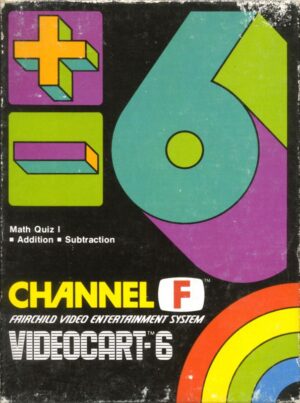Retro Replay Review
Gameplay
Videocart-8: Magic Numbers delivers a dual-puzzle experience that centers on two classic numerical challenges: Mind Reader and Nim. In Mind Reader, the system selects a secret code consisting of 2 to 5 digits, and the player has up to 20 guesses (or a set time limit) to crack it. Each guess yields feedback on how many digits are correctly positioned and how many are correct but misplaced, mirroring the tried-and-true “Mastermind” formula in a streamlined numeric format.
(HEY YOU!! We hope you enjoy! We try not to run ads. So basically, this is a very expensive hobby running this site. Please consider joining us for updates, forums, and more. Network w/ us to make some cash or friends while retro gaming, and you can win some free retro games for posting. Okay, carry on 👍)
The tension in Mind Reader ramps up quickly as wrong guesses pad the computer’s score, while correct deductions earn you points equal to your unused attempts. This tug-of-war against the clock or guess count pushes players to balance swift deduction with cautious trial and error. The option to switch between finite attempts and timed rounds adds a customizable layer of challenge, catering to both methodical thinkers and speed-focused competitors.
Nim, on the other hand, shifts the experience toward turn-based strategy. Players face 3, 6, or 9 piles of elements, varying from 1 to 15 in size. On each turn, you remove at least one element from a single pile, and the last player to make a valid move wins the round. This simple rule set belies a depth of combinatorial strategy, as optimal play hinges on mastering binary calculations and anticipating the computer’s patters.
Both game modes share the same overarching goal: be the first to reach 100 points. In Nim, winning a round grants a fixed point reward, while in Mind Reader, your remaining guesses (or seconds) translate directly into score. The ability to play with or without a timer keeps each session fresh—whether you prefer contemplative puzzle solving or rapid-fire duels, Videocart-8 adapts to your pace.
Graphics
Magic Numbers embraces the stark yet functional visuals typical of early cartridge-based consoles. All elements are rendered with crisp, block-style digits and simple lines, focusing squarely on clarity rather than flair. The monochrome or limited-color palette keeps each number legible against the contrasting background, ensuring that feedback cues in Mind Reader are immediately understandable.
On the Nim boards, piles of elements are represented by numeric counters rather than icons or sprites, reinforcing the game’s cerebral tone. While this minimalist approach may lack the decorative charm of modern puzzle titles, it also eliminates distractions—every pixel has purpose, and the layout is optimized for quick decision-making. Visual transitions are minimal, which speeds up the flow between turns and maintains player focus.
The simplicity extends to menus and scoreboards, which utilize basic text overlays and straightforward input prompts. This no-frills presentation feels authentic to the era and keeps the interface intuitive. Despite the lack of flashy animations or background music, the visual design succeeds in directing attention to the heart of the experience: pure number-based problem solving.
Story
Given its roots in classic math puzzles, Videocart-8: Magic Numbers does not offer a conventional narrative or character-driven plot. There’s no overarching storyline beyond the implied mental duel between player and machine. Instead, the “story” unfolds through each round, as you outwit the console in a battle of logic and probability.
This absence of a traditional plot need not be a drawback. The evolving dynamic—from tentative first guesses in Mind Reader to endgame calculus in Nim—forms a subtle narrative arc of challenge and mastery. Each session becomes a new chapter in your personal quest for a perfect score, and the mounting tension with each wrong guess or well-executed strategy injects its own kind of drama.
For players seeking character arcs or environmental storytelling, Magic Numbers might feel sparse. However, if you appreciate an abstract, high-stakes mental duel that applauds your analytical prowess, the game’s silent narrative of numbers speaking louder than words delivers its own satisfying storyline.
Overall Experience
Videocart-8: Magic Numbers offers a distilled puzzle experience that remains compelling decades after its initial release. By packaging two enduring mathematical games into one cartridge, it maximizes replayability without overcomplicating its rules. Whether you’re a fan of deduction in Mind Reader or strategic foresight in Nim, there’s a depth of challenge that will reward repeated play.
The minimalist graphics and absence of story-driven fluff position Magic Numbers as a pure puzzle workout, ideal for players who relish brainteasers and mental athletics. Its adaptable modes—time-limited or turn-limited—cater to diverse playstyles, from casual thinkers to speedrunners. While it won’t win awards for visual spectacle, its focus on clarity and function ensures that every session remains tight and focused.
For retro enthusiasts and newcomers alike, Videocart-8: Magic Numbers stands as a prime example of how compelling gameplay need not rely on elaborate presentation. If you seek a portable, no-nonsense number game that tests your logic, memory, and strategy, this cartridge delivers exactly that. It’s a timeless duel of wits that keeps you coming back, eager to refine your approach and outsmart the machine.
 Retro Replay Retro Replay gaming reviews, news, emulation, geek stuff and more!
Retro Replay Retro Replay gaming reviews, news, emulation, geek stuff and more!









Reviews
There are no reviews yet.